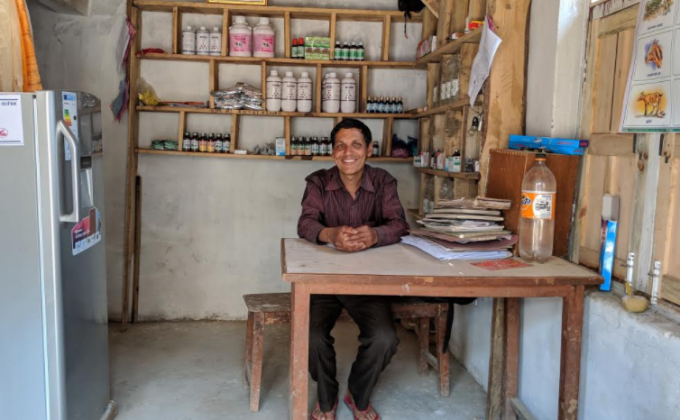
Mr. Timilsina, a resident of Bethanchowk in Kavre District of Nepal has spent the last 15 years dedicated to learning about veterinary services. The municipality he calls home is characterized overwhelmingly by rolling hills dotted by rice paddies and small scale agricultural plots. Many women and men in the area have several livestock such as buffalo and goats. It isn’t uncommon that diseases can spread through the community and seriously impact the sustenance efforts of the village residents.
CECI’s project, Punarnirman: Livelihood Promotion for Earthquake Affected Population in Nepal, works in communities that have been affected by earthquakes to help jumpstart resilient and relevant economic activities that help to improve the wellbeing of women and men. As a veterinary service provider, Mr. Timilsina’s involvement in the project is strategic and has the potential to reach a large pool of households.
This was demonstrated in early 2018 when a rabies outbreak hit the area. Mr. Timilsina received the support for the purchase of a fridge. This simple investment allows for the storage of vaccines. Previous to having the fridge, a full day was needed to transport vaccines on a need-by- need basis, complicating response time, increasing cost and limiting the reach of veterinary services. In the first few weeks of having the fridge, Mr. Timilsina has provided more than 500 vaccines which significantly reduced the outbreak of rabies.
During CECI and its partners’ visit in March 2018, he proudly told us “Today I have vaccinated 150 buffalo, now I don’t have to spend a day to bring vaccine from Dhulikhel (a full-day’s walk). I can provide service to many livestock in a day. It’s not only me, all the farmers are happy and thankful for the support from the Punarnirman project”. Following this, he is considering establishing a lab for livestock blood testing in his veterinary shop. He is also interested in other technical trainings to expand his business services.